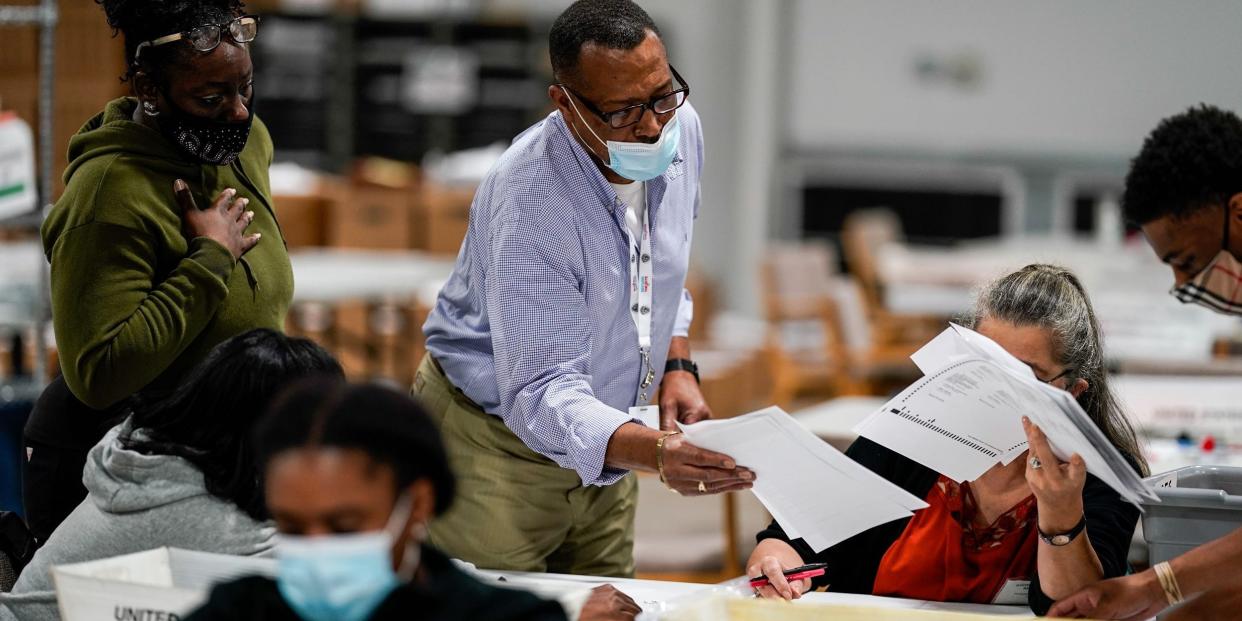The 'laughable' comparison between Colorado and Georgia voting requirements

Fox News and Republican politicians are comparing Colorado's voting laws to Georgia's.
But that comparison is "laughable," said Paul Teske of the University of Colorado, Denver.
Colorado has fully embraced voting by mail, automatically sending ballots to all registered voters.
When Major League Baseball announced it was moving its All-Star Game from Georgia to protest new restrictions on voting, local Republicans and conservative media outlets bemoaned the rise of "woke capital" and created a false equivalence. Colorado, they said - the game's new home - was really no better when it comes to voting rights.
"I think it's a little bit laughable," Paul Teske, dean of Public Affairs at the University of Colorado Denver, told Insider of the comparison. "Colorado is such an easy place to vote."
Georgia is not so easy, and it will now become more difficult.
Among other things, Georgia's new elections law, passed by the state's Republican-led legislature following a campaign by party leaders to paint the 2020 election as fraudulent, curtails the use of mail-in ballots. While before voters had up to six months before an election to request a ballot, they now have 11 weeks, and will have fewer drop boxes to cast their vote.
Crucially, people who vote by mail will also have to provide a driver's license or other state-issued identification card, similar to the requirement for in-person voting. Previously, poll workers simply checked signatures to make sure they matched those on file - a process that, according to Georgia's Republican elections officials, uncovered no real fraud.
That, according to GOP Gov. Brain Kemp, is no different than Colorado. In an appearance on Fox News this week, Kemp said he was confused by MLB's decision to move its All-Star contest to Colorado where, "I'm being told, they also have a photo ID requirement."
He was told wrong.
What counts as an "ID" in the Rocky Mountains is not the same as in Georgia. According to Colorado's Secretary of State, acceptable forms of identification include not just those issued by the state or federal government, but those printed by colleges and universities. Don't have one of those, either? Not a problem: the state also accepts utility bills, bank statements, and paycheck stubs.
In 2020, a super-majority of voters in Colorado cast their ballots by mail - all registered voters receive them automatically, as they have for years prior to the pandemic, with bipartisan support.
"The truth is Colorado's election model works," Colorado Secretary of State Jena Griswold, a Democrat, said in a statement on Tuesday. "[T]he proof is in voter turnout, consistently among the top in the nation," she said, adding the state is "grateful that MLB is giving us the opportunity to showcase how elections can be."
Mail-in ballots can also be deposited at any time; as Colorado Public Radio notes, there is one drop box for every 9,400 active registered voters, available 24 hours a day. By contrast, the new law in Georgia actually caps the number of drop boxes for ballots to one per 100,000 voters, while limiting accessibility. It also requires Georgians to provide ID every time they vote absentee, not just when they initially register (the state, previously, compared signatures, as they do in Colorado).
Nevertheless, Kemp's false claim was provided journalistic cover. Fox News, for example, published a story stating that, "As it turns out, Colorado also requires voters to show identification when voting in person." The outlet's Peter Doocy, at a White House briefing, likewise asked Biden spokesperson Jen Psaki if the administration was concerned about the MLB game moving to Colorado, "where voting regulations are very similar to Georgia."
Psaki rebutted the comparison. "It's important to remember the context here," she added. "The Georgia bill is built on a lie."
-Aaron Rupar (@atrupar) April 6, 2021
Indeed, the new Georgia law comes not after evidence of voter fraud - the state's Republican elections officials uncovered none that would alter the outcome of the 2020 election - but a concerted effort by a former president and other GOP politicians to invalidate ballots cast for Democrats.
"It's just abundantly clear, from the outside looking in, that they had some close elections but they lost," Teske said, "and so the Republican legislature is looking to restrict voting in ways that they think will help them win elections in the future."
"That is not a great way to have a democracy," he added.
Have a news tip? Email this reporter: cdavis@insider.com
Read the original article on Business Insider

